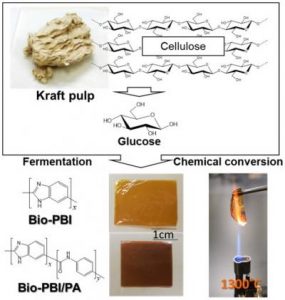
Japanese researchers create the most heat-resistant bioplastic in the world
Canadian Plastics
Materials Research & DevelopmentCreated by scientists from the Japan Advanced Institute of Science and Technology and the University of Tokyo, it can withstand temperatures up to 740°C.

Development strategy for cellulose-derived PBI and PBI/PA film having ultra-high thermoresistance and frame retardance.
The use of biomass-derived plastics is one of the big drivers in establishing a more sustainable society, but there’s a problem: the use of most of the biomass-derived plastics is severely limited due to their low heat resistance.
Aromatic backbone-based polymers – such as Zylon, Celazole, and Kapton – are widely considered for their high heat-resistance, but developing aromatic heterocyclic monomers from biomass is rarely done due to difficulty in controlling their structure. Now, however, researchers from the Japan Advanced Institute of Science and Technology (JAIST) and the University of Tokyo have successfully developed the white-biotechnological conversion from cellulosic biomass into the aromatic polymers that are said to have the highest-ever thermodegradation of all plastics.
Two specific aromatic molecules, 3-amino-4-hydroxybenzoic acid (AHBA) and 4-aminobenzoic acid (ABA) were produced from kraft pulp, an inedible cellulosic feedstock by Prof. Ohnishi and his research team in U-Tokyo. Recombinant microorganisms enhanced the productivity of the aromatic monomers selectively and inhibited the formation of the side products. Prof. Kaneko and his research team in JAIST have chemically converted AHBA into 3,4-diaminobenzoic acid (DABA); which was subsequently polymerized into poly(2, 5-benzimidazole) (ABPBI) via polycondensation and processed into thermoresistant film.
Also, incorporating a very small amount of ABA with DABA dramatically increases the heat-resistance of the resulting copolymer and processed film attributes to the highest thermostable plastic on record. Density functional theory (DFT) calculations confirmed the small ABA incorporation strengthened the interchain hydrogen bonding between imidazoles although π-conjugated benzene/heterocycle repeats have been considered as the most ideal thermoresistant plastics for around 40 years.
Organic plastic superior in thermostability (over 740 °C), was developed from inedible biomass feedstocks without using heavy inorganic fillers and thus lightweight in nature. This innovative molecular design of ultra-high temperature polymers, by controlling π-conjugation (or bond conjugation), can help eliminate harmful plastics that pollute the environment, the researchers said.
Source: Japan Advanced Institute of Science and Technology University of Tokyo
